AFL tribunal news 2022: St Kilda fails to have Paddy Ryder’s two-game ban reduced
St Kilda’s Paddy Ryder has had a rough night at the AFL tribunal - with his loophole bid to avoid suspension for a forceful bump snuffed out.
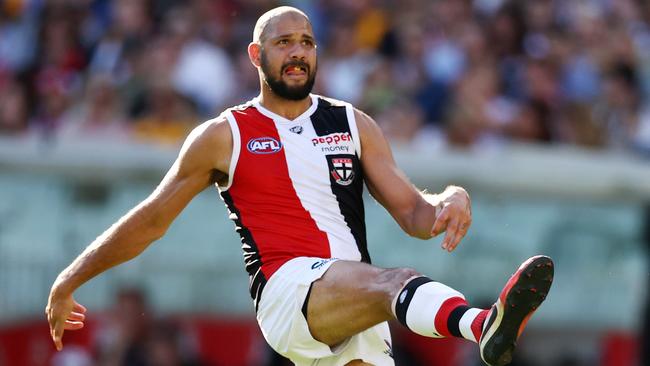
St Kilda veteran Paddy Ryder’s two-game suspension for rough conduct has been upheld by the AFL tribunal on Tuesday night.
The Saints had argued Ryder’s bump on Hawthorn’s Will Day in the second quarter on Sunday was reasonable in the circumstances and of medium impact, rather than high, despite the Hawk sustaining a concussion from the incident.
But the jury disagreed, deeming the ruckman’s contact forceful when Day had been vulnerable after he disposed of the football.
Ryder will miss games against Gold Coast on Saturday and GWS the following Friday night.
The AFL’s counsel, Andrew Woods, called the incident a hard, late bump that neatly fit into the description of high impact.
Stream every match of every round of the 2022 Toyota AFL Premiership Season Live & Ad-Break Free In-Play on Kayo. New to Kayo? Try 14-Days Free Now >
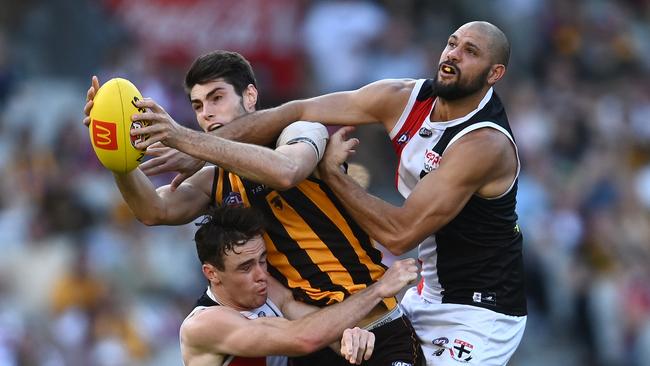
Not simply because of Ryder’s action, which jolted Day’s head back forcefully, but also because the Hawk was subbed out at half-time and entered concussion protocols this week.
Woods said Ryder had enough time to avoid such a collision and Day would not have expected it to happen or been able to protect himself.
“It doesn’t take a genius to see there was a significant potential to cause injury,” Woods said.
“Putting that aside … the injury actually eventuated.”
The Saints accepted that it was rough conduct, high contact and careless, but debated the match review officer’s of high impact.
St Kilda’s counsel, Jack Rush QC, tried to convince the tribunal that Ryder was looking to avoid or minimise the contact.
He said there was initially body contact to Day and his head went forward in a whiplash motion to make contact with Ryder’s shoulder.
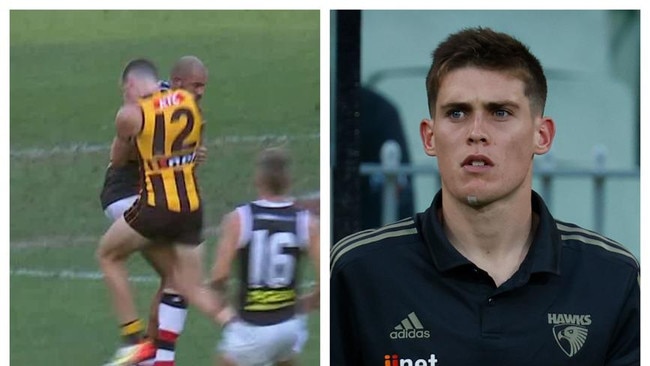
Rush pointed to Ryder’s feet being on the ground as proof it was not his momentum that caused the force of the collision.
“This isn’t a player that is running at the contest at speed,” Rush said of Ryder.
“Ryder has stopped and braced or blocked in a sense of a basketball manoeuvre and the momentum here is all one-way from player Day.”
Rush believed Day could have expected and anticipated the contact.
He also questioned the severity of Day’s facial laceration, as mentioned in Hawthorn’s medical report, saying it must have been quite minimal.
He also felt it was relevant that Day stayed on the field for about four minutes and a doctor did not take him off.
“Just because there is concussion, doesn’t necessarily mean the contact is high,” Rush said.
“That should not be the predominant decider in relation to the categorisation of impact.
Rush talked through four incidents as examples – bumps from Sydney’s Sam Reid, Collingwood’s Jordan De Goey, Levi Casboult while at Carlton and Western Bulldogs’ Tim English – but the jury did not find them to be of signifant assistance to the case.
In summarising the jury’s findings, after about 30 minutes of deliberating, chairman Jeff Gleeson QC said Day was entitled to expect he would not receive forceful contact because he had disposed of the ball.
“The contact to his head was forceful and resulted in a concussion,” Gleeson said.
Ralph: Ryder was always facing time on the sidelines
By Jon Ralph
From the endless trail of lives destroyed or irrevocably altered across the AFL community, there is always one concussion that starts the downward spiral.
Always one initial concussion that leads to a player becoming more susceptible to head knocks, to the kind of altered brain activity that can change the course of a life forever.
It is a thought that has stayed with me as I listened to grown men break down at their kitchen tables in the past few months asking them about the concussions they suffered playing AFL football.
From happy-go-lucky John Barnes, casually sipping a scotch after work in his Essendon house and then suddenly in tears at the hell he has put his wife through given epilepsy he believes is linked to his concussions.
To the anger and frustration in the voice of Peter Venables down the telephone line, a smart and capable businessman who has been through hell trying to find answers for his son Daniel after a career lost to a brutal head knock.
And Kade Kolodjashnij’s bewilderment and confusion at the conga line of AFL experts giving him advice he knew deep in his gut was plain wrong over a concussion history they sheeted home to migraines, neck issues or mental health.
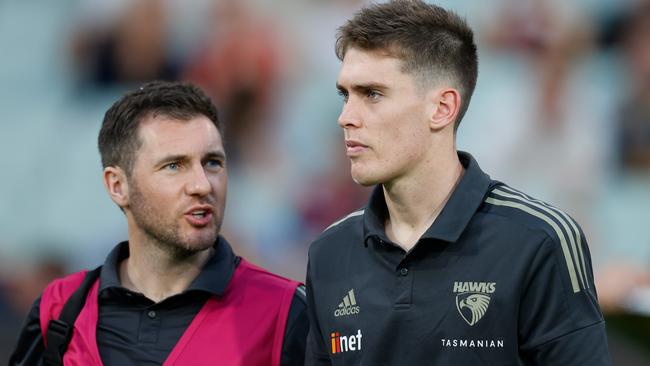
The point is this — every single thing we can do to reduce concussions at AFL level might save one player the first concussion that leads to a life destroyed.
As concussion campaigner Peter Jess says, if we can get 100 concussions a year down to 70, how will that ultimately change the lives of those 30 players who might never receive a concussion throughout their career?
How can we reduce overall concussion numbers so that over a career a player might suffer only a single concussion they can successfully manage? Rather than multiple concussions that become the pattern of damage we have seen with Paddy McCartin, Brad Ebert and Matt Maguire.
Paddy Ryder’s collision with Will Day, which concussed the Hawks youngster with a kind of whiplash effect, wasn’t savage or cowardly or even particularly forceful.
But like few other incidents on an AFL field in a 360 degree game full of accidents, it was totally avoidable.
It wasn’t an accident, it wasn’t a necessary action called for in the coaches box, it was a late bump on an unsuspecting victim who had got rid of the ball.
If he had pulled up a step short the moment would have been forgotten forever, but now Day has to deal with what Sam Mitchell says is a second concussion in as many years in such a short AFL career.
Under the AFL’s own rules Ryder copped two games for the incident.
As AFL football boss Brad Scott said over summer: “In most instances one player is late to a contest. If you’re late and you hit the player in the head, you’re going to be in trouble”.
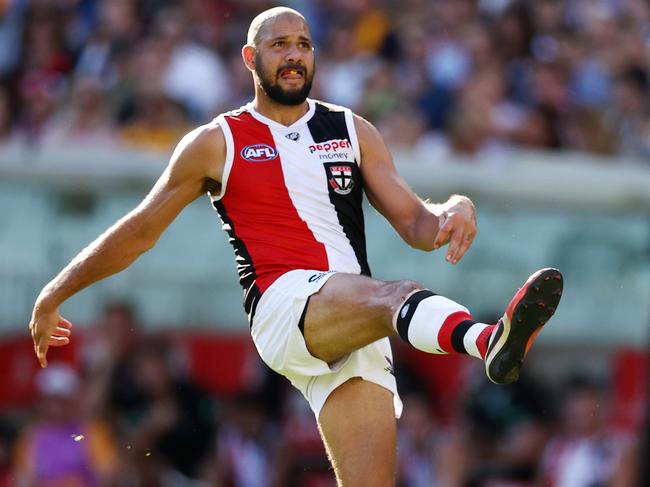
It meant Ryder had to be suspended because only suspensions change actions across the competition.
The silliest argument run by former players is that the game isn’t tough any more.
When it is played at its best in the modern age it is soft and hard in all the right places.
It is the best kind of soft when players approaching an opponent burrowing in with head over the ball show due care by not attacking him in a way they never would have considered back in the 70s.
And it is the best kind of hard with players still going back with the flight, still getting crunched in marking collisions, still breaking AC joints like Collingwood’s Jamie Elliott in legal but unfortunate accidents.
Collingwood coach Nathan Buckley said of a potential suspension on SEN on Monday that it was a slippery slope if we are legislating against the worst-case scenario in bumps, saying: “The game has got too soft if that’s a suspension”.
Buckley is a clever and compassionate man, so here is the question: would he prefer we allow Ryder to concuss an unsuspecting victim or reduce the concussion toll by one more by penalising that act so the next player stops short?
His great Collingwood warrior Levi Greenwood retired last year due to repeated concussions, lauding Buckley as “an incredible coach and friend”.
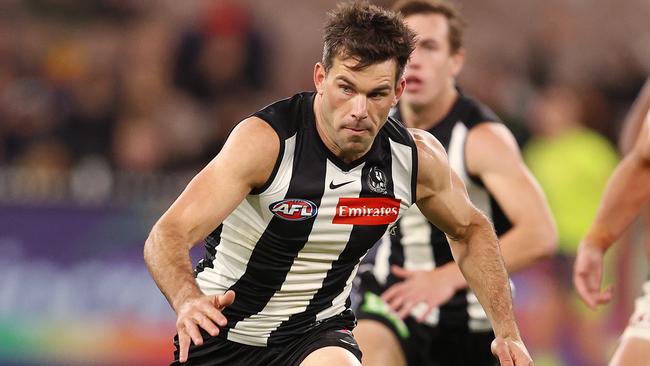
Like Barnes and Venables before him, Greenwood suffered that first concussion which would lead to his own slippery slope of damage.
Kane Cornes is a brilliant media provocateur who plied a great trade in false equivalence over the Willie Rioli bump.
He said because players often collect each other high using their knees in marking contests, Rioli should be able to jump off the ground and bump Matt Rowell high.
He is in effect saying because there will always be concussions in football through accidents we shouldn’t try to reduce the total number by ensuring players have a duty of care to each other.
His teammate of four seasons Brad Ebert retired after one more knock going back with the flight in the 2020 preliminary final, but imagine if he had never suffered that initial concussion that started the chain of events?
No one truly knows where the concussion battle will end up.
A class action or a multimillion-dollar pool of funding for players whose lives are torn apart, or a proper workers compensation scheme to help players who can no longer live normal lives post-AFL.
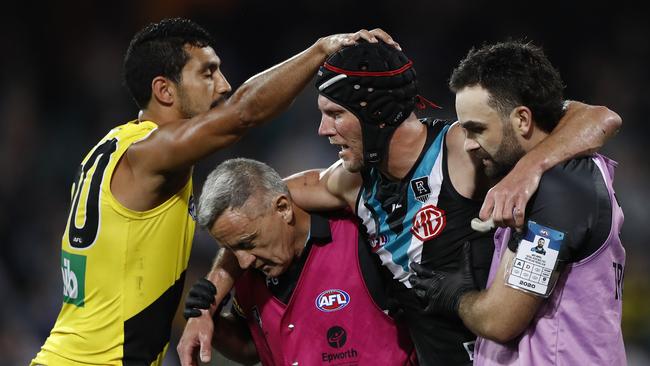
What we do absolutely know with a total certainty is that reducing the total number of concussions across an AFL season has to help shorten the list of players who can no longer get out of bed or hold a job or simply end their lives like Shane Tuck and Danny Frawley.
Michael Christian handed the Saints tall two games for a hit assessed as high impact, high contact and careless.
It won’t make football soft.
It won’t take the courageous back-with-the-flight mark out of the game.
But it might help the next player in Ryder’s situation show a greater duty of care.
And that action might stop the butterfly effect of a single low-level concussion which might start the chain that ruins a life.






To join the conversation, please log in. Don't have an account? Register
Join the conversation, you are commenting as Logout